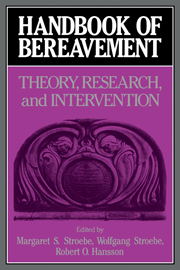Book contents
- Frontmatter
- Contents
- Contributors
- Preface
- Part I Introduction
- Part II The phenomenology and measurement of grief
- Part III Current theories of grief, mourning, and bereavement
- Part IV Physiological changes following bereavement
- Part V The psychological, social, and health impacts of conjugal bereavement
- Part VI Grief reactions to different types of loss
- Part VII Coping, counseling, and therapy
- Part VIII Conclusions
- References
- Author index
- Subject Index
Preface
Published online by Cambridge University Press: 04 May 2010
- Frontmatter
- Contents
- Contributors
- Preface
- Part I Introduction
- Part II The phenomenology and measurement of grief
- Part III Current theories of grief, mourning, and bereavement
- Part IV Physiological changes following bereavement
- Part V The psychological, social, and health impacts of conjugal bereavement
- Part VI Grief reactions to different types of loss
- Part VII Coping, counseling, and therapy
- Part VIII Conclusions
- References
- Author index
- Subject Index
Summary
Until fairly recently, researchers interested in the topic of bereavement tended to be scattered throughout the world, having little contact with one another and not much knowledge of each other's work. This was to some extent true of the editors of the current volume, until a conference meeting in the early 1980s led to the discussion of joint interests and the beginning of a collaboration that has continued without pause ever since. The main objective of our collaboration has been to work toward a synthesis of scientific evidence on the impact of bereavement. Out of this interest came a special issue of the Journal of Social Issues, “Bereavement and Widowhood,” in 1988, to which an international, interdisciplinary group of bereavement researchers contributed.
Due to the constraints of a journal, the scope of the issue had to be limited. Thus, it seemed a natural extension of this work to produce a more comprehensive volume that would provide readers with an up-to-date account of knowledge about bereavement's impact and effects and the possibilities for social or policy intervention and treatment: The Handbook of Bereavement is the result of this endeavor. Well over half of the chapters were newly commissioned. Leading researchers from many different disciplines and many countries, including Australia, Canada, Israel, the United Kingdom, and the United States, were invited to contribute. It was very gratifying that, as for the journal issue, the response was overwhelmingly positive, such that all of the chapters are by “first-choice” authors.
Information
- Type
- Chapter
- Information
- Handbook of BereavementTheory, Research, and Intervention, pp. xi - xiiPublisher: Cambridge University PressPrint publication year: 1993
